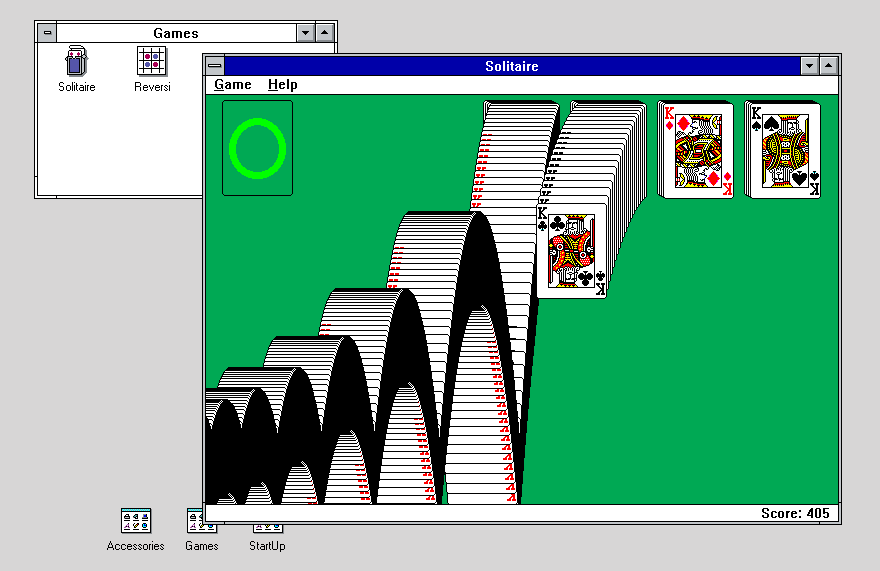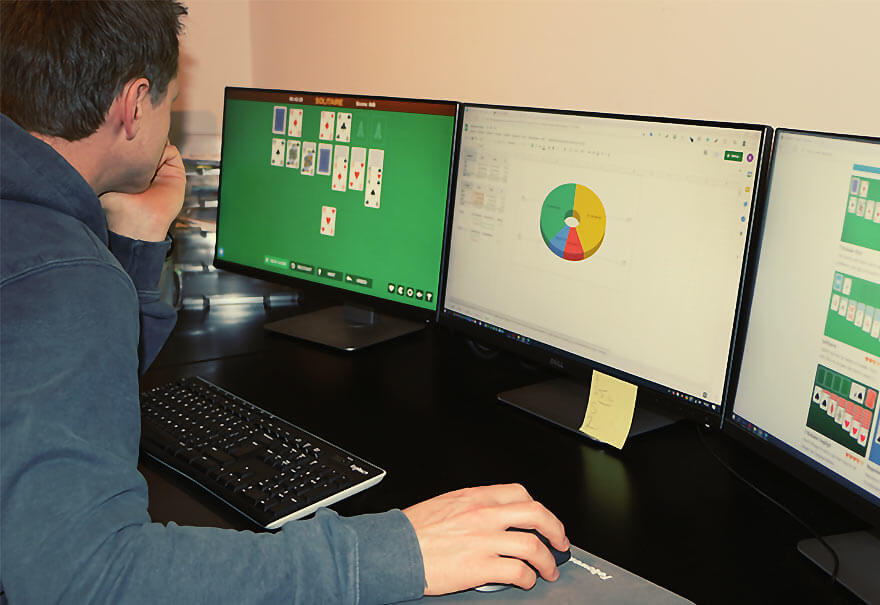The Viral Game: How Solitaire Captured Our Hearts and PCs
Anna | Updated October 29, 2024

Everyone loves computer gaming! However, in a high-tech world with racing, shooting, fantasy, and strategy games all around us—playable on apps, the web, and gaming consoles, sometimes it helps to get back to basics.
Think about it. Which game do you think is the most popular and frequently played game of all time? Given the website you're on right now, the answer probably won't surprise you. It is, of course, the card game Klondike Solitaire. A default game on all devices utilizing the Windows 3.0 operating system or above since 1990, Klondike Solitaire has been available to play for free for decades. Even now, most operating systems come with this and several other simple, card-based games such as Spider Solitaire and Freecell.
To most computer users and gamers, the Microsoft company and Solitaire go hand-in-hand. It's hard to imagine the Windows experience without thinking about passing the time playing Solitaire. However, the story of this game goes back much further in history. Microsoft certainly did not develop the game—it's believed to have been around since the Middle Ages. Of course, back then, Solitaire was played with a real deck of cards rather than using a computer or device, but the game was, otherwise, similar to the version we play today. While Microsoft may not have conceived the game itself, it would likely have fallen from popularity if it hadn't been reborn as a computer-based game.
Now, for a quick Cinderella story… The creator of Solitaire for Windows was a mere intern at Microsoft! In 1988, when he developed the computerized version of Solitaire to create a simple, digital card game, it caught on! He showed the game to colleagues who were so intrigued that it led to the game being added to Windows 3.0, which was still in its developmental period. Another key player in creating this gaming phenomenon was Susan Kare, the card designer for the original iteration. Interestingly enough, she was also the designer of the very first Apple logos!
No one would have guessed this simple, solo game would strike such a massive chord with computer users. The Solitaire phenomenon was the first time a regular PC game (let alone a free one!) had gone viral to Microsoft's great delight. For Microsoft, this high level of popularity could not have been more perfectly timed. After all, it was around that period that the consumer PC market was beginning to take off. As companies aimed to improve the accessibility of personal computers to a broader retail audience, this simple game played a pivotal role. By ushering the first widespread buyers into a game with a concept they could easily understand—playing cards—and putting it on a screen, Microsoft could capitalize on this simple way to introduce new users to the keyboard, mouse, screen interface. Keep in mind that very few people had any experience with such devices, even for work purposes, let alone playing a game. The whole concept felt revolutionary!
Further, along with the novelty of gaming on a computer, it made life easier. Rather than setting up a game on your own, which was time-consuming, all it took was a few clicks of the mouse. There was no need for manual scoring as it was scored automatically in a split second. We know people love convenience, and—along with a visual appeal that was untouchable for the time—this generated massive numbers of players to take up the game, many of whom still return to the game religiously even today.

Not only was Solitaire well-loved at home, but people often joke that it was a productivity drain in offices around the world! Even now, a screen with a game of Solitaire open on it is immediately seen as a pop culture reference to slacking off at work. This is entirely understandable! While it is less common today, Solitaire was the most widely used Windows program at one time. Without any struggle, during the 1990s, everyone could identify at least one colleague who could be seen playing occasional Solitaire games during office hours.
Now, before we give Solitaire players a bad rap for being lazy at work, let's look at some interesting research. Apart from all the anecdotes and popular stories connected to the game leading to a lack of productivity, it's actually not the case. A well-known university conducted research on the productivity of employees who were allowed to play Solitaire on their office computers. And guess what? It revealed that those employees permitted to play the game were even slightly more productive than their peers. It is believed that the game offers a timed break, providing a distraction that can be kept in check based on the game length. It allows the brain to focus on something else for a while, while still in a focused state, and enables users to get back to work with renewed energy afterward.
Solitaire—an old game that made a comeback with some new tricks!
